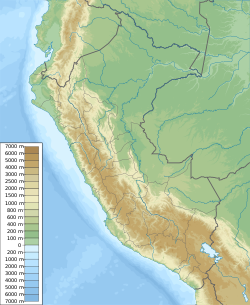November 1960 Peru earthquake
| UTC time | 1960-11-20 22:01:57 |
|---|---|
| ISC event | 880820 |
| USGS-ANSS | ComCat |
| Local date | November 20, 1960 |
| Local time | 17:02 |
| Magnitude | 7.6 or 7.8 Mw[1] |
| Depth | 35 km (22 mi)[1] |
| Epicenter | 6°42′S 80°37′W / 6.70°S 80.62°W[1] |
| Areas affected | Peru |
| Max. intensity | Felt [2] |
| Tsunami | Yes |
| Casualties | 66 dead, 2 injured [3] |
The November 1960 Peru earthquake occurred offshore northern Peru on November 20 at 17:02 local time. The magnitude of the earthquake was Ms 6.75 by using the conventional surface-wave magnitude measurement within a shorter duration of ~20 s.[4][5] However, there is a large discrepancy between the magnitudes in Ms and Mw in this earthquake. The discrepancy was caused from the earthquake's long source duration of about 130 s, and by calculating the seismic moment, the magnitude would be Mw 7.6 or Mw 7.8, according to different sources.[1][5] This earthquake belongs to a category of earthquakes with slow rupture velocities and potential of producing tsunamis larger than those expected from the moment magnitudes.[6]
A tsunami with a height of 9 meters (30 ft) was triggered and struck Puerto Eten, Lambayeque Department.[7] The tsunami caused damage along the coast of the Lambayeque Department. Three deaths were reported in Lambayeque Department. Thirteen deaths and 50 missing were reported in the Guañape Islands, La Libertad Department. The tsunami was also observed in Hilo, Hawaii.[7]
See also
[edit]References
[edit]- ^ a b c d Engdahl, E. R.; Vallaseñor, A. (2002). "Global seismicity: 1900–1999" (PDF). International Handbook of Earthquake & Engineering Seismology. Part A, Volume 81A (First ed.). Academic Press. p. 681. ISBN 978-0124406520. Archived from the original (PDF) on 6 August 2011.
- ^ "Significant Earthquake Information". ngdc.noaa.gov. NOAA National Centers for Environmental Information. Retrieved 3 March 2022.
- ^ "Tsunami Event Information". ngdc.noaa.gov. NOAA National Centers for Environmental Information. Retrieved 3 March 2022.
- ^ Lay, Thorne; Bilek, Susan. "Anomalous Earthquake Ruptures at Shallow Depths on Subduction Zone Megathrusts" (PDF). pmc.ucsc.edu. Retrieved 7 July 2022.
- ^ a b Pelayo, A. M.; Wiens, D. A. (1990). "The November 20,1960 Peru Tsunami Earthquake: Source mechanism of a slow event". Geophysical Research Letters. 17 (6): 661–664. Bibcode:1990GeoRL..17..661P. doi:10.1029/gl017i006p00661.
- ^ Sladen, A.; Tavera, H.; Simons, M.; Avouac, J.P.; Perfettini, H.; Audin, L.; Fielding, E.J.; Ortega, F.; Cavagnoud, R. (2010). "Source model of the 2007 Mw 8.0 Pisco, Peru earthquake: Implications for seismogenic behavior of subduction megathrusts" (PDF). Journal of Geophysical Research. 115 (B2): B02405. Bibcode:2010JGRB..115.2405S. doi:10.1029/2009JB006429.
- ^ a b National Geophysical Data Center (1972). "Comments for the Tsunami Event". National Geophysical Data Center / World Data Service (NGDC/WDS): Significant Earthquake Database. National Geophysical Data Center, NOAA. doi:10.7289/V5TD9V7K. Retrieved 21 April 2020.

